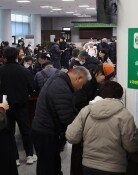[Editorial] Wartime Control Backlash
[Editorial] Wartime Control Backlash
Posted August. 12, 2006 10:21,
About five thousand members of organizations for discharged military men, including Seongwoohoe for reserved army generals, gathered at the Seoul Station Square yesterday to protest against the return of wartime operational control. Sixty reserve army generals, including former national defense ministers who issued a statement against it the day before, participated in the meeting in old military uniform. Former defense minister Kim Seong-eun came to tears in his speech saying, Think about how we have tried to defend Taegeukgi and our country. Lee Sang-hun, another ex-defense minister, scolded the government, saying, The wartime control is shared by Korea and the U.S., but the government is stirring up anti-American sentiment by deceiving the people as if the U.S. is the sole holder of wartime control.
President Roh Moo-hyun should take this unprecedented situation seriously. Those who worked for the current government are now turning their backs. Cho Yeong-kil, the first national defense minister of the Roh government, signed up for the statement against the take-over, while former foreign affairs and trade minister Yun Yeong-gwan, former national defense aide Kim Hee-sang, and former ambassador Han Seung-ju voiced concern about the thoughtless immaturity of the government. It shows how serious the situation is.
On August 9, the day it was reported that President Roh said, We are able to take wartime operational control even now if it is returned, National Defense Minister Yoon Kwang-ung, a representative of the Roh code, is said to have told military elders that he would make sure the wartime control could not be returned before 2012 as earliest. How can the people not feel anxious if the president and the national defense minister have such different opinions? What will the U.S. think?
Henry Hyde, Chairman of the House International Relations Committee, said yesterday on his flight back after his visit of Korea, I do not understand why we are feeling estranged fighting over such an issue. Scott Snyder, a senior researcher at the Center for Strategic and International Studies (CSIS) who is versed in issues related to the Korean peninsula, warned, Korea is not a place of strategic importance any more. The U.S. can retreat (completely) from the Korean peninsular as Secretary of State Dean Acheson did in the 1940s.
The government is possibly pushing for the return of the wartime control out of its obstinacy or its problematic ideas when its term of office is going to end in one and half years. We suggest the government be redirected without going on to increase the peoples resistance.







